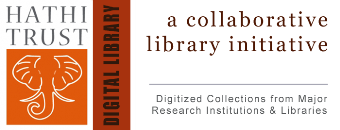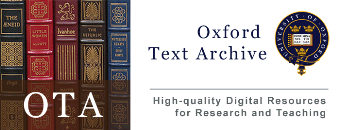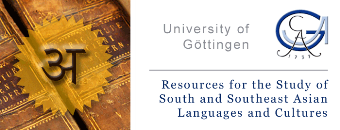![]() Introduction
Introduction
Please note that operation of optional courses depends on the
availability of the faculty and the interest of the students
enrolled. All courses
will be available only in English medium. Only four (4) optional
courses are
to be chosen for Postgraduate Diploma. All courses carry three
credits each and the independent study one credit, while an
applicant should earn 25 credits to be qualified for the diploma.
Overview
| Semester |
Course
Code |
Course Title |
Prerequisites |
Status
(C/ O) |
| First |
GRS 501 |
Elementary Greek/
Latin I
|
None
|
C
|
| First |
GRS 503 |
History of Greek
Literature
|
None
|
C |
| First |
GRS 506 |
Greek Sculpture of
the Classical Period |
None
|
O |
| First |
GRS 507 |
Greek and Roman
Mythology |
None
|
O |
| Second |
GRS 502 |
Elementary Greek/
Latin II |
GRS 501 |
C |
| Second |
GRS 504 |
History of Roman Literature |
None |
C |
| Second |
GRS 505 |
Cicero, the Man
and his Works |
None
|
O |
| Second |
GRS 508 |
Greek and Roman
Drama |
None |
O |
| Second |
GRS 509 |
History of the
Roman Republic |
None |
O |
C = Compulsory | O = Optional
![]() Diploma Course Syllabus
Diploma Course Syllabus
Semester ONE
GRS 501 - Elementary Greek/ Latin I
| Course Code |
GRS 501 |
| Course Title
|
Elementary Greek/ Latin
I |
| ILOs
|
At the end of the
course students will be able to read unabridged
verse and prose passages in simple Greek or
Latin and explain simple grammatical and
syntactical features of the language and comment
on how they make the language function. |
| Course
Description |
Latin: Verbs: 1st
and 2nd conjugations; nouns and
cases: 1st declension; 2nd
declension; adjectives; tenses: indicative;
irregular verbs; 3rd declension; 3rd
conjugation; imperative; demonstratives; 4th
conjugation; personal pronouns; reflexive
pronouns; possessives; 3rd declension
‘i’ stem nouns; ablative; numerals; genitive;
adjectives; passive voice: 1st and 2nd
conjugations; relative pronoun; perfect active
of all verbs; perfect passive of all verbs; 4th
declension; present passive of all verbs; 5th
declension.
Greek: Verb
forms: endings, indicative mood; declensions;
nouns and cases; the imperative; articles;
infinitives; adjectives; adverbs; contract verbs
in ‘a’; agreement of subject and verb; personal
pronouns; possessive adjectives; attributive and
predicate position; middle voice; dative case;
prepositions; reflexive pronouns; interrogative
pronoun and adjective; indefinite pronoun and
adjective; participles: active, middle; numbers;
impersonal verbs; aorist; imperfect; relative
clauses; comparison of adjectives; demonstrative
adjectives, interrogatives and indefinites;
contract verbs in ‘o’. |
GRS 503 - History of Greek Literature
| Course Code |
GRS 503 |
| Course Title
|
History of Greek Literature |
| ILOs
|
At the end of the
course students will be able to evaluate some of
the earliest known literary works in the world
and explain the different styles of authors,
their aims and objectives, and the role and
place of literature in ancient Greece. They will
also be able to assess the influence of the
different authors and their literary works on
each other in addition to their influence on
modern literature in respect of literary aims
and objectives, genres and traditions. |
| Course
Description |
Homer; Hesiod; cyclic
epics; Homeric hymns; elegy and iambus; archaic
choral lyric; monody; choral lyric of the 5th
century; tragedy; comedy; early Greek
philosophy; historiography; sophists; Plato;
Xenophon; oratory; Aristotle; post-Aristotelian
philosophy; Hellenistic poetry; the literature
of the empire. |
GRS 506 - Greek Sculpture of
the Classical Period
| Course Code |
GRS 506 |
| Course Title
|
Greek Sculpture of
the Classical Period |
| ILOs
|
At the end of the
course students will be able to comment on the
different styles of Greek sculpture of the 5th
and 4th Centuries BC, and identify
the sources that influenced them. They will also
be able to identify how the Greeks adapted
sculpture for different purposes, and analyze
and assess the influence of Greek sculpture on
modern architecture in the West as well as in
the East. |
| Course
Description |
Archaic period; early
classical relief sculpture; votive and
architectural reliefs; grave reliefs/monuments;
Parthenon; Myron; Phedias; Polycleitus; Cresilas
and other major and minor sculptors; style and
characteristics of late classical sculpture;
architectural sculpture; sculpture of gods and
goddesses, men, women and children of the 4th
century; portrait sculpture; themes, uses and
significance of sculpture. |
GRS 507 - Greek and Roman
Mythology
| Course Code |
GRS 507 |
| Course Title
|
Greek and Roman
Mythology |
| ILOs
|
At the end of the
course students will be able evaluate the use of
myth and their variants in Greek and Roman
literature, vase paintings, and sculpture, and
assess the significance of myths in the life and
thought of the Greeks and the Romans. |
| Course
Description |
Definition of myth;
interpretation of myth; myth and truth; myth and
religion; historical background of Greek
mythology; Homer; myths of creation- the gods;
the creation of mortals; the twelve Olympians;
the nature of the gods; myth, religion and
philosophy; Poseidon, sea deities, group
divinities and monsters; Athena; Aphrodite and
Eros; Artemis; Apollo; Hermes; Dionysus; Demeter
and the Eleusinian mysteries; afterlife and
Hades; mystery religions. |
Semester TWO
GRS 502 - Elementary Greek/
Latin II
| Course Code |
GRS 502 |
| Course Title
|
Elementary Greek/
Latin II |
| ILOs
|
At the end of the
course students will be able read unabridged
verse and prose passages in advanced Greek or
Latin and explain complex and difficult features
of syntax and grammar and how they contribute to
the structure of ancient Greek / Latin. They
will also be able to read and explain the
grammatical features of difficult verse and
prose passages and, begin reading in the
original Greek authors such as Plato in Greek
and Caesar in Latin. |
| Course
Description |
Latin: Participles;
ablative absolute; passive periphrastic; dative
case; infinitives; indirect statement;
comparison of adjectives and declension of
comparatives; special and irregular comparison
of adjectives; subjunctive mood; present
subjunctive; jussive and purpose clauses;
imperfect subjunctive; result clauses; perfect
and pluperfect subjunctive; sequence of tenses;
indirect questions; cum clauses;
formation and comparison of adverbs; proviso
clauses; conditions; deponent verbs; dative with
compounds and special verbs; jussive noun
clauses; constructions of place and time;
relative clauses of characteristic; supines;
gerund and gerundive; fear clauses.
Greek: The future tense; irregular verbs;
the genitive absolute; attributive and predicate
position of adjectives; the subjunctive mood;
the uses of the subjunctive; clauses of fearing;
indefinite or general clauses; indirect
statements and questions; the passive voice;
aorist of deponent verbs; comparison of
adjectives; the optative mood; correlatives;
perfect and pluperfect middle and passive; the
articular infinitive; conditional clauses. |
GRS 504 - History of Roman Literature
| Course Code |
GRS 504 |
| Course Title
|
History of Roman Literature |
| ILOs
|
At the end of the
course students will be able to evaluate some of
the earliest known literary works in the world
and explain the different styles of authors,
their aims and objectives, and the role and
place of literature in ancient Rome. Students
will also be able to assess the influence of the
different authors and their literary works on
each other in addition to their influence on
modern literature in respect of literary aims
and objectives, genres and traditions. |
| Course
Description |
The early Roman
theatre: Livius Andronicus, Naevius, Plautus,
Caecilius Statius; oratory and historiography of
the archaic period; Ennius; Cato; Terence;
development of tragedy; development of epic
poetry; neoteric poetry and Catullus; Lucretius;
Cicero; philosophy; biography; Caesar; Sallust;
Virgil; Horace; Elegy; Ovid; Livy;
historiography; scholarship and technical
disciplines; Seneca; Lucan; Petronius; Perseus
and Juvenal; Epic in the Flavian period; Pliny
the Elder; Martial and the epigram; Quintilian;
Pliny the Younger; Tacitus; Suetonius and minor
historians; Apuleius; philology, rhetoric and
literary criticism, law. |
GRS 505 - Cicero, the Man
and his Works
| Course Code |
GRS 505 |
| Course Title
|
Cicero, the Man
and his Works |
| ILOs
|
At the end of the
course students will be able to assess the
contribution of Cicero to oratory, philosophy,
law, politics and literature, and analyze the
impact of his works on ancient as well as modern
literature, life, and thought. |
| Course
Description |
The personality, career
and the many-sided literary genius of Cicero;
contribution to Roman culture, philosophy, and
law; his political ideal (concordiaordinum)
and its failure; speeches, essays, letters, and
poetry.. |
GRS 508 - Greek and Roman
Drama
| Course Code |
GRS 508 |
| Course Title
|
Greek and Roman
Drama |
| ILOs
|
At the end of the
course students will be ableto identify and
explain some of the main characteristics of
Greek tragedy and Greek and Roman comedy, and
assess their contribution to European
literature, art, music as well as their
influence on modern Sri Lankan drama. |
| Course
Description |
The origin and
development of Greek and Roman drama: dramatic
festivals, Dionysus, drama and the polis;
tragedy and Greek religion; major Greek
tragedians and their works: Aeschylus,
Sophocles, Euripides; other tragedians; the
satyr play; Livius Andronicus, Naevius, Ennius,
Pacuvius, Accius, Seneca; origin and development
of Roman comedy; Greek old comedy; Middle
comedy; Menander and New comedy; Roman comedy;
Plautus, Terence. Prescribed texts. |
GRS 509 - History of
the Roman Republic
| Course Code |
GRS 509 |
| Course Title
|
History of the Roman
Republic |
| ILOs
|
At the end of the
course students will be able to identify and
explain the socio – political, economicand
literary atmosphere of Rome from the Punic Wars
to the rule of Augustus Caesar, and assess the
role played by the individuals and institutions,
and their impact on the period under
investigation. |
| Course
Description |
Sources for the early
history of Rome; archaic Rome; origins of Rome;
Rome in the 5th and 4th
centuries BC; the conquest of Italy; Rome and
Italy in the 3rd century; Carthage
and Rome; 2nd century BC; 1st
century BC; early principate. |
![]() Introduction
Introduction![]() Diploma Course Syllabus
Diploma Course Syllabus








